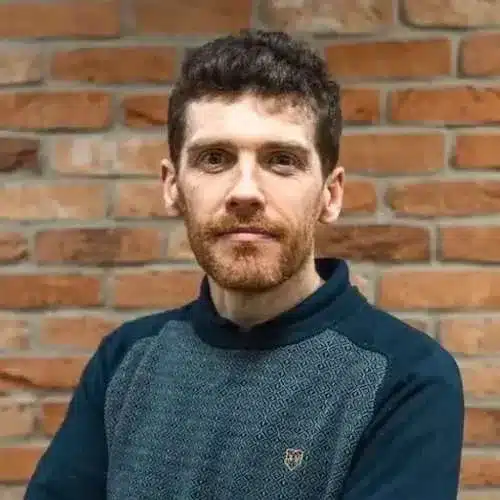
Relentless dedication and an uncanny ability to burn the candle at both ends are often traits and outcomes associated with an early-stage entrepreneur.
But Newry man – and founder of tech start-up, Uptime Labs – Joe McKevitt, simply cannot – and will not – afford himself the luxury of unfettered time. He’s a dad to five young children – the oldest being 12; the youngest just one!
Nonetheless, he’s an obsessive. He is driven, but time is currency and time management is his thing, and even if he admits to not having that quite figured out yet, he’s better than a lot of entrepreneurs. He has to be!
Joe is one of three founders behind Uptime Labs, alongside London-based Hamed Silatani and Jack Moore.
But what is Uptime Labs? In layman’s terms, it’s a business for companies that care about their uptime.
While pilots and emergency services train constantly for worst case scenarios, Uptime Labs have created a simulator for major IT outages at firms which, historically, have not catered for those critical eventualities. Times are changing and IT is the heartbeat of most modern companies.
The idea for the business came about seven years ago. Joe and Hamed were senior employees at a major training firm. When things went wrong, it was usually at huge expense. An IT outage would cost millions.
Joe described these outages to me as ‘black swan events’ – unpredictable in their very nature. In terms of dealing with them effectively, Joe uses aviation for an apt analogy.
“If something goes wrong in the air, a pilot is not going to panic and throw his hands up, you wouldn’t have it. It’s the same with the fire service, it’s all muscle memory. It might still be a new situation you’ve never seen but you have a clear head to deal with it. IT is moving more and more into becoming a safety critical system and people are just not ready for it. There’s no regulation, no thorough practice in place and this is where we see an opportunity.”
Seven years ago, Joe was asked to help up-skill staff and carry out in-house drills to mimic ‘black swan events’ but with the high attrition of staff associated with big firms, this training was costing thousands every month, so Joe looked about “buying a programme off the shelf”.
“We went to the market to find this idea, to buy this product but we couldn’t find it anywhere and that was the genesis; there’s an opportunity here for us, but it took us five years to get the courage to do it.”
Then came Covid, it was the trigger; a black swan event on a global scale. Remote working fast became the norm.
“The idea of giving people remote tools is now really realistic,” says Joe. “Back in the day it was the boss looking over your shoulder looking it fixed as quickly as possible. It’s now all online and that worked to our advantage.
“We saw an opportunity but we didn’t know the price point that companies were willing to pay for it.
“A lot of startups would build a product for a year before going to market. We went to customers first with a very early prototype and asked them what they wanted to see and that was very stressful. There were three or four of us working like mad from one week to the next but we managed to prove our value and bagged a few early customers.”
Uptime Labs began making money after just a couple of months but running a company as a young father to five children is no easy task, as Joe would attest.
“I was working for a big company; I’d worked with them for maybe 12 or 13 years and I needed a new challenge.”
Challenge himself, he did.
Joe then went on to change jobs at the beginning of Covid. It was a new, smaller scale – younger company – but for Joe it was the right fit at the time.
“I did four days a week and one day for myself, and that one day was basically used to build up the idea of Uptime Labs. It went way faster than I thought it would. I was thinking it would probably take two or three years to build the company but within a year we’re out full time.
“In the meantime, my wife and I managed to have a fifth surprise. The ball was rolling on the new venture at that point and next thing you know my wife says, ‘I’m pregnant, you’re having a fifth’, and I said, ‘how, am I gonna have a baby and run a startup?’”
Fortunately, having Hamed alongside him as co-founder has been “massive” for Joe.
“The way my situation is, I definitely couldn’t do this on my own,” Joe admits. “I need a team around me to go into battle.”
That very month Joe and Hamed went full-time, Joe’s wife had that fifth child.
“Honest to goodness, just surviving, I don’t know how we did it.”
He laughs it off now and while it’s still a work in progress, they have coped – riding roughshod over conventional wisdom of ‘it can’t be done’!
“Life before Uptime Labs,” explained Joe, “I sort of worked in a very senior stressful job but it was for someone else. It wasn’t your own business; you think you’re busy until you have your own company and that’s when you realise what busy is.”
Joe was working long hours and balancing the school runs with his wife, Joanne. Without her, Joe says, none of what he is doing at the moment would be possible. Joanne has sacrificed a lot of her own career to support Joe – something he is deeply thankful for. Together, they make having a large family and running a start-up look a little easier than it should.
For the sake of investors, being a dad to five children and running a start-up is a walk in the park. In reality, Joe says he has to be a “very, very disciplined person”.
“I had to be,” he said. “I’d tell anyone, it’s tough, if they asked. You’ve no idea how tough it is until you do it yourself, which is why I think talking to other small business owners, co founders, you have an empathy with them.”
Joe made the decision that he wasn’t going to sacrifice everything else around him just to succeed in business – he doesn’t have to sacrifice to achieve what he wants.
“Like every book you read about startups, or anyone who talks about startups that say, ‘oh, you need 60-70 hour work weeks’ and all that, this is insane.”
Joe had previously been working in London but moved back home to Newry eight years ago; his wife and two children at the time in tandem.
“I wasn’t going to sacrifice my family time. My colleagues, who were in same position as me were getting up at 6am and not seeing their kids until the weekend. That was the norm in 2015.
“My dad was a teacher and he was always there. I thought to myself, no way; I was going to be there for my kids no matter what. I’ll not regret being there for my kids. It’s nothing glamorous; it’s getting them up, dressed and off to school, but I’m present and that’s important.”
Joe says his mornings with the kids are “crazy”, as many working parents will second. His working days usually start at around 9.15am and he finishes at 5.30pm, after which he literally turns around in his chair – he demonstrates as much during our chat – and his children are there with their homework.
“I try not to do any work in the evenings. I might do a half an hour at the end of the day just to get ready for the next day.”
Joe’s days are meticulously planned out, down to the half hour. Treating himself to lunch on a Friday from the shop goes in the diary too.
On Monday mornings, Joe takes the first two hours to plan out his week. He doesn’t take any meetings and sets aside any potential distractions. On a Saturday, Joe and Hamed will speak about the week just past. It’s a chance to “blow off steam”.
Come Sundays and work.. “I don’t do anything – don’t do a thing,” – Joe’s emphatic about that. “The kids need me to be checked in and I need the time to recharge.”
Every Sunday morning Joe will go for a run, for at least an hour, or do some form of exercise, if injury prevents him from running.
“It’s my favourite time of the week – it’s my time,” he tells me. “It’s such a healthy thing to have and when you don’t do it, you’re miserable.”
Joe got into running during his time in London; needless to say it became an obsession, but as kids came along and work piled up, there was a natural friction point – he couldn’t time manage everything.
“It took me a couple years to catch myself on, a sort of self-realisation that you can’t do everything. You can’t be the best runner, employee, dad, husband – you have to make trade-offs. I started realigning my goals and asking myself, what is running about for me? I didn’t give up on it but it’s important to make it all work for you.”
Joe’s quest for personal bests quelled with time, something he puts down to maturity and wisdom.
Time management and productivity is a more recent obsession. In true entrepreneurial form he told me he’d quite like to be an executive coach for time management – a personal trainer, as such, for time. There’s always a business idea floating around. At the present moment, he doesn’t quite have the time for that…
“I’m obsessed with time management. I’ve been down a rabbit hole looking into this, but to be clear, I don’t have it figured out. I always say when you go to university, they should give you a module and train you for six months on time management because it is so important.”
Joe references David Allen’s timeless book Getting Things Done and Cal Newport’s Deep Work as essential reading for anyone looking to get better with their time.
And there are principals with time management Joe applies to his own organisation, especially given Uptime Labs’ remote-first approach.
How do we work more effectively together? is a question he often asks. Since he started working remotely in 2015, commuting to London once a month for a couple of days at a time, he came to the realisation that “you’re either fully remote or you’re fully on site”.
“This halfway thing, that’s a disaster. It’s very hard to get right,” he says. “So our DNA in Uptime Labs is that we were a remote-first company from the get go. We will hire people in Northern Ireland but the paradigm is totally different as a remote company.
“Anyone who says to me, ‘we need to meet’, I would always challenge that. We get into this mindset that we need to meet face-to-face to do our job. Meeting face-to-face is for relationship building, trust building, 100%, but I have a colleague in Sri Lanka who is a brilliant engineer but he cannot be disadvantaged because of his location. Once you start meeting some face-to-face and not others, you diminish your remote first approach completely.”
And when you do go remote first, communication is key – and for Joe, everything has to be written down.
“If you’ve a conversation it doesn’t exist unless you write it down. Written communication is very, very important. It doesn’t matter what you agree in a meeting, if you don’t write it down, it doesn’t exist. That’s just a culture of transparency.”
Personally, for Joe, he lives by his written notes.
“I have a system – nothing is in my head. I will always write it down to get it out of my head,” says Joe.
He speaks about having closed loops. Open loops, where ideas and a to-do list is floating about in the back of your mind heightens stress. Always write things down.
What does the future hold for Uptime Labs?
At the moment, the company runs “very, very lean”.
“We’re not fans of growing out the company too soon,” Joe says. “We don’t think the more headcount the better, in fact, we’re the opposite, we think the leaner you can be the better. We’re software engineers so we’re always thinking how we can automate things.”
There are six employees spread across Ireland, the UK and the rest of the world. They also employ a gig economy for that second layer of staff – ad-hoc work.
While Uptime Labs is, on the face of it, a remote company that can hire from any corner of the globe, Joe sees its headquarters firmly rooted in Newry.
“I’m always talking about Uptime Labs being in Newry,” he says. “We’re an export company. So the customers we have are based in Canada, the Netherlands and India.
“This space is really immature so there’s definitely opportunities there but the DNA is going to be Newry for as along as I’m running this company. My co-founder, Hamed, is totally on board with this and that’s largely down to two reasons; one is Brian Conlon. When you think of what he did with First Derivatives, it gives me that inspiration to think, ‘why not?’ And more recently with STATSports, you get your cluster effect?
“I’m old enough to remember how Brian started First Derivatives. He’s a massive influence for me. Why can’t we do that here in Newry?
“Secondly, Invest NI have been very supportive to us and I know how good they were for STATSports. The team in Newry have been very supportive of me; they’ve been so good and the Uptime Labs team – particularly Hamed – has seen that and can’t believe how helpful they are. London is very competitive but here in Northern Ireland – in Newry – they see an opportunity and they get behind you.
“My idea is to try and follow the Brian Conlon model where you hire bright, hungry mindsets. People here roll up their sleeves and they have good people skills.”
It might just be the recipe for another major Newry success on the world stage.
To find out more about Uptime Labs, visit the link here.
You can check out all our previous interviews here.
And if you want to get involved, or reach out to me for any reason, simply reply to this email (if you’ve read it in your inbox), comment below, or find me on LinkedIn here.
Finally, if you fancy coming on board as a sponsor, please do reach out – I’d love the support to help build this into something much bigger.






